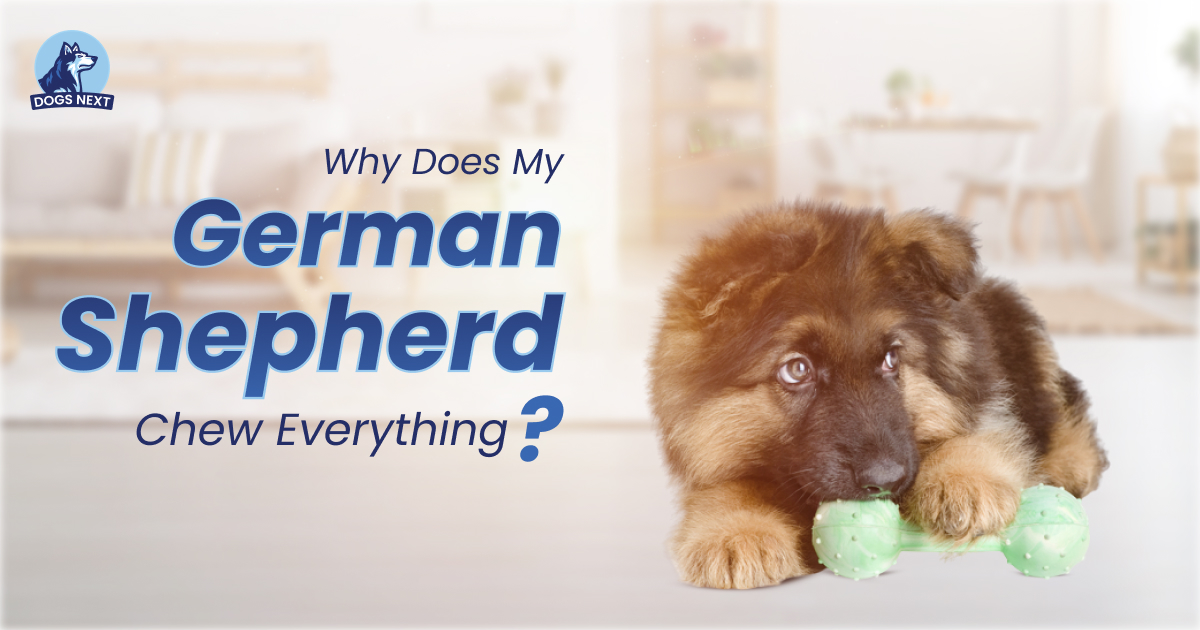As a German Shepherd owner, it can be frustrating to come home to chewed-up furniture, shoes, and other household items. But before you get too upset with your furry friend, it’s important to understand that chewing is a natural behavior for dogs, particularly for puppies who are teething.
However, destructive chewing can also be a sign of boredom, anxiety, or other underlying behavioral or medical issues. In this article, we’ll explore the reasons why German Shepherds tend to chew everything and provide tips and solutions for managing this behavior.
We’ll cover topics such as appropriate chew toys, crate training, and addressing underlying behavioral or medical issues. By the end of this article, you’ll have a better understanding of your German Shepherd’s chewing behavior and how to prevent destructive chewing in your furry friend.
Table of Contents
10 Reasons Why Does My German Shepherd Chew Everything? Explained and Solved
Chewing is a natural behavior for dogs, particularly for puppies who are teething. However, destructive chewing can be a frustrating and costly problem for German Shepherd owners. If your furry friend is chewing everything in sight, there are several potential reasons why, including boredom, anxiety, and medical issues.
Here are the top 10 reasons why your German Shepherd might be chewing everything, and solutions for managing this behavior.
| Reason | Description | Solution |
| Teething | Puppies chew to alleviate the pain and pressure of teething. | Provide appropriate chew toys, such as frozen carrots or rubber toys, and discourage chewing on inappropriate items. |
| Boredom | Dogs may chew out of boredom or lack of mental stimulation. | Provide interactive toys, puzzles, and plenty of exercise and playtime. Consider hiring a dog walker or doggy daycare. |
| Separation anxiety | Dogs with separation anxiety may chew when left alone. | Gradually acclimate your dog to being alone, provide a comfortable crate or designated chew area, and consider using calming supplements or medications. |
| Lack of training | Dogs who haven’t been trained not to chew may continue the behavior into adulthood. | Provide clear boundaries and consequences for inappropriate chewing, and reward good behavior. Consider professional training. |
| Medical issues | Certain medical issues, such as dental problems, can cause dogs to chew. | Regular vet check-ups can catch and address medical issues. |
| Attention-seeking | Dogs may chew to get attention from their owners. | Provide plenty of positive attention and praise for good behavior, and ignore inappropriate behavior. |
| Hunger | Hungry dogs may chew in an attempt to find food. | Ensure your dog is getting enough food and provide healthy, appropriate treats. |
| Lack of exercise | Dogs who don’t get enough exercise may turn to chew as a way to release energy. | Provide plenty of exercise and playtime, and consider hiring a dog walker or doggy daycare. |
| Fear or anxiety | Dogs may chew as a way to cope with fear or anxiety. | Address the underlying fear or anxiety through desensitization, counter-conditioning, or professional help. |
| Environmental factors | Dogs may chew due to factors in their environment, such as noise or unfamiliar scents. | Identify and address any environmental factors that may be causing stress or anxiety for your dog. |
Understanding Your German Shepherd’s Chewing Behavior
If you’re a German Shepherd owner, it’s important to understand your dog’s chewing behavior to prevent destructive chewing and keep them healthy and happy. Here are some key things to keep in mind:
- Chewing is a natural behavior for dogs, particularly puppies who are teething. It helps to relieve discomfort and pain in their gums and allows them to explore their environment.
- However, destructive chewing can also be a sign of boredom, anxiety, or other underlying behavioral or medical issues. For example, a German Shepherd who is left alone for long periods may resort to chewing as a way to relieve stress or anxiety.
- Providing appropriate chew toys is essential for managing chewing behavior in German Shepherds. Look for toys that are durable, non-toxic, and designed specifically for your dog’s size and age. Avoid giving your dog household items, such as shoes or furniture, as chew toys.
- Crate training can be an effective way to manage chewing behavior in German Shepherds, particularly when they have left alone at home. Make sure the crate is comfortable and provides enough space for your dog to move around.
- Addressing underlying behavioral or medical issues is also important for managing chewing behavior in German Shepherds. If your dog’s chewing behavior is excessive or destructive, consider consulting with a veterinarian or a professional dog trainer to address any underlying issues.
Are German Shepherds Bad Chewers?
German Shepherds are not inherently bad chewers, but they do tend to chew on things due to their strong jaws and natural chewing behavior.
Here are some tips for preventing destructive chewing in German Shepherds:
- Provide plenty of exercises and mental stimulation to prevent boredom and anxiety.
- Use positive reinforcement training techniques to teach your dog appropriate chew behavior.
- Provide appropriate chew toys and rotate them frequently to keep your dog interested.
- Use deterrent sprays or bitter-tasting substances on household items to discourage your dog from chewing on them.
- Crate training can be an effective way to manage chewing behavior when you’re not home.
- Address any underlying behavioral or medical issues that may be contributing to your dog’s chewing behavior.
Tips For Preventing Destructive Chewing in Your German Shepherd
While chewing is a natural behavior for dogs, it’s important to prevent destructive chewing. They can destroy everything that can cause damage to your home and potentially harm your German Shepherd. Here are some tips for preventing destructive chewing in your furry friend:
Provide appropriate chew toys
Give your German Shepherd a variety of safe and durable chew toys to satisfy their chewing needs. Avoid giving your dog items that resemble household objects, such as shoes or pillows, as this can confuse your dog about what’s appropriate to chew on.
Supervise your dog
When you can’t watch your German Shepherd, confine them to a safe space, such as a crate or playpen, with appropriate chew toys. Gradually increase the amount of time your dog spends out of confinement as they learn what’s appropriate to chew on.
Exercise your dog
Regular exercise and playtime can help reduce anxiety and boredom, which can contribute to destructive chewing. Make sure your German Shepherd is getting enough physical and mental stimulation through walks, games, and training sessions.
Address underlying issues
If your German Shepherd’s chewing behavior is caused by anxiety or other underlying issues, it’s important to address these issues through training, behavior modification, or medical intervention.
By following these tips, you can help prevent destructive chewing in your German Shepherd and promote a happy and healthy relationship with your furry friend.
Common Mistakes to Avoid When Addressing Chewing Behavior in German Shepherds
When trying to address chewing behavior in your German Shepherd, it’s important to avoid common mistakes that can worsen the problem. Here are some mistakes to avoid:
Punishing your dog: Punishing your German Shepherd for chewing can increase their anxiety and cause them to chew more. Instead of punishment, focus on positive reinforcement when your dog chews appropriate items.
Failing to supervise: Leaving your German Shepherd alone with access to household objects can lead to destructive chewing. Make sure to supervise your dog and confine them when you can’t watch them.
Inconsistent reinforcement: If you allow your German Shepherd to chew on inappropriate items sometimes but not others, this can confuse your dog about what’s appropriate to chew on. Be consistent with your reinforcement and provide appropriate chew toys.
Failing to address underlying issues: If your German Shepherd’s chewing behavior is caused by underlying anxiety or medical issues, it’s important to address these issues through training, behavior modification, or medical intervention.
By avoiding these common mistakes, you can effectively address your German Shepherd’s chewing behavior and promote a healthy relationship with your furry friend.
At What Age Do German Shepherds Stop Chewing Everything?
As a German Shepherd owner, you may be wondering when your furry friend will stop chewing everything in sight. While every dog is different, there are some general milestones when it comes to chewing behavior.
German Shepherds are known for their strong chewing instincts, which can last well into adulthood. However, there are some signs that your German Shepherd may be starting to outgrow their chewing phase.
By the age of one year old, most German Shepherds will have their full set of adult teeth. This can be a good sign that they are beginning to move out of their teething phase, which is a major reason why puppies chew everything in sight. However, this doesn’t necessarily mean that your German Shepherd will stop chewing altogether.
In general, German Shepherds will start to settle into their adult chewing habits between the ages of one and two years old. This means that they may still enjoy chewing on appropriate toys and bones, but should be less likely to destroy household items or chew on inappropriate objects.
However, it’s important to note that every dog is different and some German Shepherds may continue to have strong chewing instincts well into adulthood. Additionally, chewing behavior can be influenced by factors such as anxiety, boredom, and underlying medical issues, so it’s important to address any concerning behavior with your veterinarian.
Frequently Asked Questions
Q: How do I get my German Shepherd to stop chewing on things?
Ans: Providing appropriate chew toys, crate training, and addressing underlying behavioral or medical issues can help prevent destructive chewing.
Q: Are German Shepherds heavy chewers?
Ans: Yes, German Shepherds are known to be heavy chewers, especially during puppyhood and adolescence.
Q: At what age does a German Shepherd stop chewing?
Ans: German Shepherds may continue to chew throughout their lives, but destructive chewing behavior often improves as they mature and reach adulthood.
Q: Do German Shepherds chew furniture?
Ans: Yes, German Shepherds are known to chew furniture, shoes, and other household items, especially when left unsupervised or when experiencing anxiety or boredom.
Q: What are good chew toys for German Shepherds?
Ans: Good chew toys for German Shepherds include rubber toys, chew bones, and toys designed specifically for heavy chewers.
Q: What should I do if my German Shepherd bites me?
Ans: If your German Shepherd bites you, it’s important to seek professional help from a veterinarian or a qualified dog trainer. Addressing underlying behavioral or medical issues may be necessary to prevent future biting incidents.
Conclusion
In conclusion, chewing is a natural behavior for German Shepherds and other dogs, but destructive chewing can be frustrating and costly for owners. By understanding the reasons why your German Shepherd might be chewing everything, and implementing appropriate solutions, you can help prevent destructive chewing and create a happier, healthier home for you and your furry friend.
Remember to provide plenty of appropriate chew toys, use crate training if necessary, and address underlying behavioral or medical issues if your dog’s chewing behavior persists.
So, if you’re struggling with a German Shepherd who seems to chew everything in sight, don’t despair. With patience, consistency, and the tips provided in this article, you can help your dog develop better chewing habits and avoid costly damage to your home.

I’m David, an expert contributor and writer, with two furry friends of my own, I know the challenges of raising and caring for dogs. From training to nutrition and health, my goal is to provide valuable insights and advice to help create strong bonds and happy, healthy lives. Find me in Twitter.




